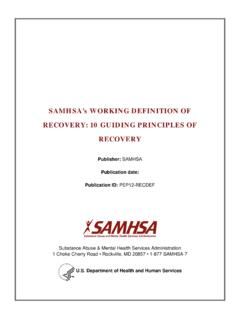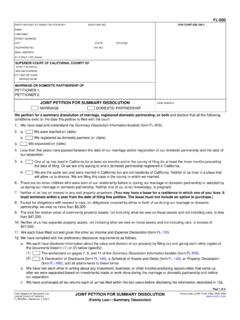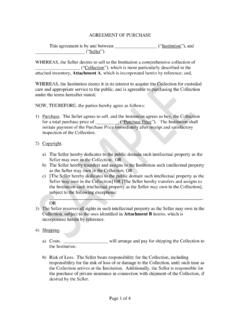Transcription of Advance Directives - Michigan
1 Advance Directives Planning for Medical Care in the Event of Loss of Decision-Making Ability Bradley Geller Michigan Long Term Care Ombudsman Program LONG TERM CARE OMBUDSMAN PROGRAM M I C H I G A N 3 Advance Directives Planning for Medical Care in the Event of Loss of Decision-Making Ability Durable Power of Attorney for Health Care Living Will Do-Not-Resuscitate Order Declaration of Anatomical Gift 02/2014 4 5 Foreword We all value the right to make decisions for ourselves. Whether we term this autonomy, liberty or independence, it is central to our concept of dignity. One important area in which we exercise independence is in choosing the medical treatment we receive.
2 Few would deny a competent adult has the right to consent to or refuse particular medical treatments or medically related services. Unfortunately, due to illness or injury, we may not remain able to participate in treatment decisions. Such disability may be temporary or permanent. No one likes to consider the possibility of becoming unable to make decisions. It is easy to put off thinking about that happening, and what treatment we would like in those circumstances. As difficult as it is to confront these issues, by doing so we can help ensure our wishes are honored in the future. Once you determine your wishes, the process of planning is relatively simple and inexpensive or free. This pamphlet contains information on Advance Directives to assist you.
3 The fill-in-the-blanks forms at the end of the pamphlet are but one option should you choose to proceed. 6 7 Questions and Answers About Advance Directives A. Introduction What is an Advance directive? An Advance directive is a written document in which you specify what type of medical care you want in the future, or who you want to make decisions for you, should you lose the ability to make decisions for yourself. Why is there a need for Advance Directives ? Years ago, most individuals died in their own homes. Today, there is greater chance of dying in a hospital or nursing home. Expanding technology has increased the treatment choices we face, and improved public health has increased life expectancy. Decisions may have to be made concerning our care at a time we can no longer communicate our wishes.
4 What are the advantages of having an Advance directive? We each have our own values, wishes and goals. Having an Advance directive provides you some assurance your personal wishes concerning medical and mental treatment will be honored at a time when you are not able to express them. Having an Advance directive may also prevent the need for a guardianship imposed through the probate court. 8 Must I have an Advance directive? No. The decision to have an Advance directive is purely voluntary. No family member, hospital or insurance company can force you to have one, or dictate what the document should say if you decide to write one. A hospital or nursing home or hospice organization cannot deny you service because you do or don't have an Advance directive.
5 Are there different types of Advance Directives ? Yes. Three types are a durable power of attorney for health care, a living will, and a do-not-resuscitate declaration. There is also a declaration of anatomical gift, to take effect when you die. Can I have more than one type of Advance directive? Yes. You may choose to have any number of Advance Directives , or to have none at all. B. Durable Power of Attorney For Health Care What is a durable power of attorney for health care? A durable power of attorney for health care, also known as a health care proxy or a patient advocate designation, is a document in which you appoint another individual to make medical treatment and related personal care decisions for you when you can no longer make them for yourself.
6 9 You can, in addition, choose to give your patient advocate power to make decisions concerning mental health care you may need. Finally, you can empower your patient advocate to donate specific organs or your entire body upon your death. Is a durable power of attorney for health care legally binding? Yes. Who is eligible to have a durable power of attorney for health care? You must be at least 18 years old, and you must understand you are giving another person power to make certain decisions for you should you become unable to make them. Is there a required form for a durable power of attorney for health care? No. You may choose to use the sample form in this pamphlet. There are a number of organizations that provide different, free forms.
7 Make sure in completing any document you type or print clearly. Must I use a fill-in-the-blanks form? No. You may write out your own document or have a lawyer draft a document for you. Using the form in this pamphlet is one option you have. 10 What is the person to whom I give decision-making power called? That person is known as your patient advocate. When can the patient advocate act in my behalf? Your patient advocate can make decisions for you only when you become unable to participate in medical treatment decisions yourself. Until that time, you make your own decisions directly. If you choose to give your patient advocate power to make decisions about mental health treatment, your patient advocate can only act if you cannot give informed consent to mental health treatment.
8 How might I become unable to participate in medical or mental health decisions? You might have a temporary loss of ability to make or communicate decisions if, for example, you had a stroke or were knocked unconscious in a car accident. You might suffer permanent loss through a degenerative condition, such as dementia. You might become unable to make mental health decisions if a condition such as severe depression or schizophrenia affected your mood or thought process. Who determines I am no longer able to participate in these decisions? The doctor responsible for your care and one other doctor or psychologist who examines you will make that determination in the case of medical decisions. After examining you, a doctor and a mental health professional (physician, psychologist, registered nurse or masters-level social worker) must 11 each make the determination in respect to mental health treatment.
9 You may in the document choose the doctor and mental health professional you wish to make this determination. What if my religious beliefs prohibit an examination by a doctor? You should state in your durable power of attorney document your religious beliefs prohibit an examination by a doctor, and how you want it determined you are unable to participate in health care decisions. What powers can I give a patient advocate? You can give a patient advocate power to make those personal care decisions you normally make for yourself. For example, you can give your patient advocate power to consent to or refuse medical treatment for you; arrange for mental health treatment, home health care or adult day care; or admit you to a hospital, nursing home or home for the aged.
10 You can also authorize your patient advocate to make a gift of your organs or body, to be effective upon your death. Will my patient advocate have power to handle my financial affairs? You can give your patient advocate power to arrange for medical and personal care services, and to pay for those services using your funds. Your patient advocate will not have general power to handle all your property and finances. If you wish another person to handle all your property and financial affairs should you become incapacitated, you could seek a lawyer's help to draft a durable power of attorney for finances or a living trust. 12 Can I give my patient advocate the right to withhold or withdraw treatment that would allow me to die? Yes, but you must express in a clear and convincing manner the patient advocate is authorized to make such decisions, and you must acknowledge these decisions could or would allow your death.














